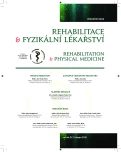-
Medical journals
- Career
Occupational Therapy
Authors: O. Švestková
Authors‘ workplace: Klinika rehabilitačního lékařství 1. LF UK a Všeobecné fakultní nemocnice v Praze, přednostka doc. MUDr. O. Švestková, Ph. D.
Published in: Rehabil. fyz. Lék., 22, 2015, No. 1, pp. 38-44.
Category: Review Article
Overview
Occupational therapy is associated with all means and stages of rehabilitation, despite being considered a healthcare field in the Czech Republic. In the European countries and worldwide, the trend in recent years suggests the important role of occupational therapy not only in healthcare but also in the social sphere. Occupational therapy is an integral part of rehabilitation. Its aim is to preserve or restore a person’s abilities through the use of meaningful activities and employment. Meaningful activities are selected individually for each individual of any age category according to the importance so that they can manage their routine daily living and the occupational, educational, social, leisure and recreational activities that are essential to them. Occupational therapists diagnose the functional condition of an individual, including the diagnosis of their functional abilities to manage activities of daily living, cognitive functions in terms of activities of daily living, motor skills and the function of the upper extremities, prevocational rehabilitation for the purpose of occupational and educational rehabilitation, diagnosis of leisure activities that an individual is able to perform, and diagnosis of environmental factors in relation to facilitators and barriers. Based on the results of the examinations and the diagnosis, the occupational therapist designs a short - and long-term occupational therapy plan and recommends customized occupational therapy in order to achieve the maximum possible quality of life. Occupational therapy in healthcare is conducted as prescribed by a doctor.
Keywords:
occupational therapy, activities of daily living, functional abilities, prevocational rehabilitation, International Classification of Funkcioning, Disability and Health
Sources
1. ČESKÁ ASOCIACE ERGOTERAPEUTŮ. [online]. Praha: Definice ergoterapie. ©2008 [cit. 2013-10-03]. Dostupné z: http://www.ergoterapie.cz/Events_List.aspx.
2. FAKTOROVÁ, M.: Vyšetření ergoterapeutem a terapie kognitivních a percepčních poruch u pacientů po postižení mozku. In: kol. autorů. Neurologie. Praha, Triton, 2003, s. 386. ISBN 80-7254-431-4.
3. FLORIANO, K. J.: Uniform date system for medical rehabilitation. Osobní sdělení, 2009.
4. Folstein, M. G., Folstein, S. E., Mc Hugh, P. R.: Mini-mental state: a practical metod for grading the cognitive state of patiens for clinican. Journal of Psychiatric Research, 12, 1975, s. 189-198.
5. HEJZLAROVÁ, V., POKORNÁ, K.: Poradím si sám! Kompenzační pomůcky a úpravy prostředí v praxi. Praha, Asistence, o.s., 2012, s. 60.
6. INTERNATIONAL BOBATH INSTRUCTORS TRAINING ASSOCIATION. An international association for adult neurological rehabilitation. [online]. Amstelveen: Bobath concept. ©2013 [cit. 2013-11-03]. Dostupné z: http://www.ibita.org/.
7. JAMAR HYDROLIC HAND USER INSTRUCTION. [online]. parkway North: Jamar Users manual. ©2004 [cit. 2013-11-12]. Dostupné z: https://www.chponline.com/store/pdfs/j-20.pdf.
8. JEBSEN TEST OF HAND FUNCTION. [online]. sydney: Jebsen summary. ©2012 [cit. 2013-11-12]. Dostupné z: http://www.rehabmeasures.org/Lists/RehabMeasures/DispForm.aspx?ID=1025.
9. JELÍNKOVÁ, J., KRIVOŠÍKOVÁ M., ŠAJTAROVÁ L.: Ergoterapie. Praha, Portál, 2009, s. 270. ISBN 978-80-7367-583-7.
10. KLUCKÁ, J., VOLFOVÁ, P.: Kognitivní trénink v praxi. Praha, Grada Publishing, a.s., 2009, s. 150. ISBN 978-80-247-2608-3.
11. KRIVOŠÍKOVÁ, M.: Úvod do ergoterapie. Praha, Grada Publishing, a.s., 2011. s. 364. ISBN 978-80-247-2699-1.
12. LIPPERTOVÁ-GRÜNEROVÁ, M.: Neurorehabilitace. Praha, Galén, 2005, s. 350. ISBN 80-7262-317-6.
13. MEADOWS, L., RAINE, S., LYNCH-ELLERINGTON, M.:. Bobath Concept: theory and clinical practice in neurological rehabilitation. Oxford,Wiley-Blackwell, 2009. s. 216. ISBN 978-1-4051-7041-3.
14. OREL, M., FACOVÁ, V.: Člověk, jeho mozek a svět. Praha, Grada Publishing, a.s., 2009. 1. vyd., s. 256. ISBN 978-80-247-2617-5.
15. PAVLŮ, D.: Speciální fyzioterapeutické koncepty a metody I. Brno, CERM, 2002. s. 239. ISBN 80-7204-266-1.
16. PURDUE PEGBOARD TEST USER INSTRUCTION. [online]. parkway North: Purdue Pegboard model 320 20. User manual. ©2004 [cit. 2013-11-12]. Dostupné z: http://www.google.cz/url?sa=t&rct=j&q=&esrc=s&source=web&cd=15&ved=0CJ4BEBYwDg&url=http%3A%2F%2Fwww.si-instruments.com.au%2Flafayette%2Ffiles%2Fdownload%2Flafayette-current-version-purdue-pegboard-test-32020-lafayette-32020-purdue-pegboard-test-manual-pdf.html&ei=-47CUv7eNoTBtAa0roHADg&usg=AFQjCNG-JMZ3d0y6kUyDNsdD5Td9csdqtA&sig2=Q15H6CMMESibqaO6coNcVA&bvm=bv.58187178,d.Yms
17. ŠVESTKOVÁ, O., SVĚCENÁ K.: Ergoterapie. In: Kalvach, Z. a kol.: Křehký pacient a primární péče. Praha, Grada Publishing, a.s., 2011, s. 400. ISBN 978-80-247-4026-3.
18. ŠVESTKOVÁ, O. a kol.: Metodiky psychosenzomotorického potenciálu člověka. Praha, Rozvojové partnerství PENTACOM, 2008, s. 54.
19. ŠVESTKOVÁ, O., PFEIFFER, J.: Mezinárodní klasifikace funkčních schopností, disability a zdraví. In: Lippert-Grünerová, M.: Neurorehabilitace. Praha, Galen, s. 350. ISBN 80-7262-317-6.
20. TURNER-STIKES, L.: The UK FIM+FAM (Functional Assessment Measure) Developed by the UK FIM+FAM Version 2.1. Brief overview 1994.
21. UDSMR Uniform Date System For Medica Rehabilitation. The Fim System Clinical Guide. Version 5.2. New York: Uniform Date System for Medical Rehabilitation, 2009, 183 s.
22. VZP - Metodika. Všeobecná zdravotní pojišťovna [online]. VZP, ©2012 [cit. 2012-8-20]. Dostupné z: http://www.vzp.cz/uploads/document/ciselnik-860-metodika-860.pdf/.
Labels
Physiotherapist, university degree Rehabilitation Sports medicine
Article was published inRehabilitation & Physical Medicine

2015 Issue 1-
All articles in this issue
- Sole Pressure Sore in Diagnostics of Functional Foot Types
- Heel Pain in the Heel Region
- Canis Therapy and Its Use in Rehabilitation
- Efficacy Comparison of Individual and Group Physiotherapy in Patients with Urinary Incontinence
- Problems in Using Surface Electromyography – Remarks On Selected Aspects of Application in Therapeutic Rehabilitation
- Influence of Epicondylar Brace On Viscoelastic Properties of Soft Tissues in Diagnostics of Tennis Elbow
- Occupational Therapy
- Rehabilitation & Physical Medicine
- Journal archive
- Current issue
- Online only
- About the journal
Most read in this issue- Occupational Therapy
- Heel Pain in the Heel Region
- Sole Pressure Sore in Diagnostics of Functional Foot Types
- Canis Therapy and Its Use in Rehabilitation
Login#ADS_BOTTOM_SCRIPTS#Forgotten passwordEnter the email address that you registered with. We will send you instructions on how to set a new password.
- Career

